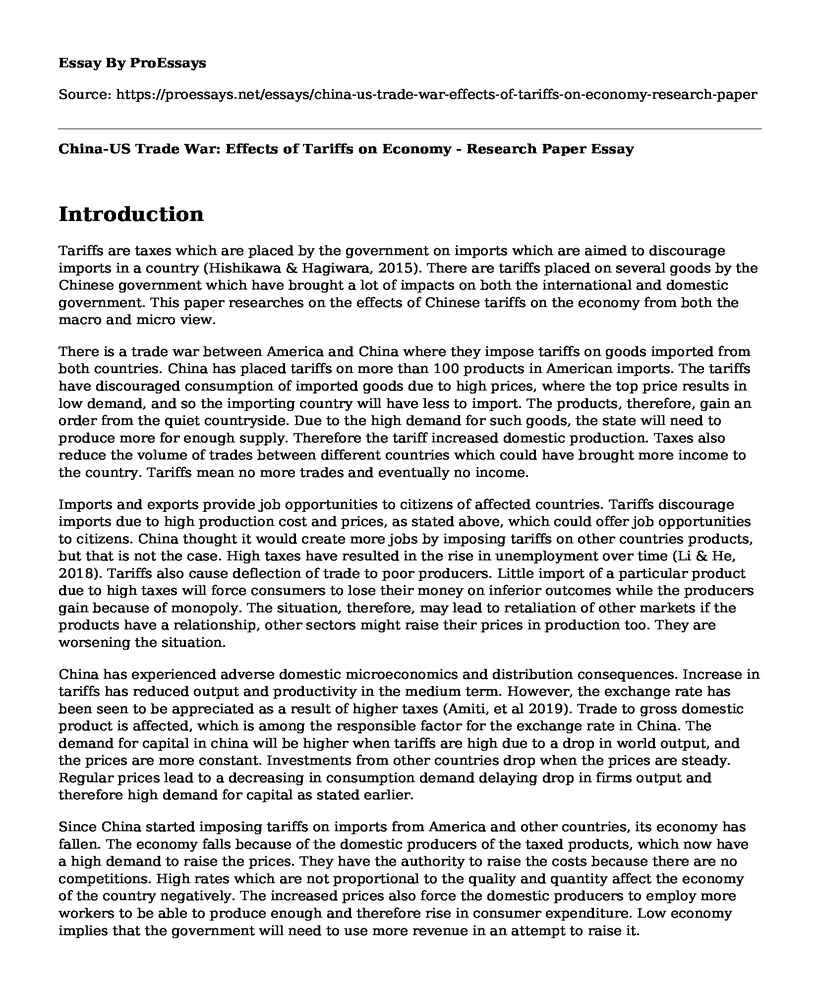Introduction
Tariffs are taxes which are placed by the government on imports which are aimed to discourage imports in a country (Hishikawa & Hagiwara, 2015). There are tariffs placed on several goods by the Chinese government which have brought a lot of impacts on both the international and domestic government. This paper researches on the effects of Chinese tariffs on the economy from both the macro and micro view.
There is a trade war between America and China where they impose tariffs on goods imported from both countries. China has placed tariffs on more than 100 products in American imports. The tariffs have discouraged consumption of imported goods due to high prices, where the top price results in low demand, and so the importing country will have less to import. The products, therefore, gain an order from the quiet countryside. Due to the high demand for such goods, the state will need to produce more for enough supply. Therefore the tariff increased domestic production. Taxes also reduce the volume of trades between different countries which could have brought more income to the country. Tariffs mean no more trades and eventually no income.
Imports and exports provide job opportunities to citizens of affected countries. Tariffs discourage imports due to high production cost and prices, as stated above, which could offer job opportunities to citizens. China thought it would create more jobs by imposing tariffs on other countries products, but that is not the case. High taxes have resulted in the rise in unemployment over time (Li & He, 2018). Tariffs also cause deflection of trade to poor producers. Little import of a particular product due to high taxes will force consumers to lose their money on inferior outcomes while the producers gain because of monopoly. The situation, therefore, may lead to retaliation of other markets if the products have a relationship, other sectors might raise their prices in production too. They are worsening the situation.
China has experienced adverse domestic microeconomics and distribution consequences. Increase in tariffs has reduced output and productivity in the medium term. However, the exchange rate has been seen to be appreciated as a result of higher taxes (Amiti, et al 2019). Trade to gross domestic product is affected, which is among the responsible factor for the exchange rate in China. The demand for capital in china will be higher when tariffs are high due to a drop in world output, and the prices are more constant. Investments from other countries drop when the prices are steady. Regular prices lead to a decreasing in consumption demand delaying drop in firms output and therefore high demand for capital as stated earlier.
Since China started imposing tariffs on imports from America and other countries, its economy has fallen. The economy falls because of the domestic producers of the taxed products, which now have a high demand to raise the prices. They have the authority to raise the costs because there are no competitions. High rates which are not proportional to the quality and quantity affect the economy of the country negatively. The increased prices also force the domestic producers to employ more workers to be able to produce enough and therefore rise in consumer expenditure. Low economy implies that the government will need to use more revenue in an attempt to raise it.
Conclusion
In conclusion, however, China tries to battle with other countries, especially America, in a tit-for-tat war in employing tariffs in their imports; it suffers a lot in its economy. Although there is some little benefit like a rising in the gross domestic product, the negative impact surpasses the benefits. China does not suffer alone; other countries will also suffer, thereby causing a drop in the economy of the world.
Reference
Ishikawa, M., & Hagiwara, T. (2015). Economic and environmental impact analysis of carbon tariffs on Chinese exports. Energy Economics, 50, 80-95.
Li, C. &He, C. (2018). Economic Impacts of the Possible China-US Trade War. Emerging Markets Finance and Trade, 54(7), 1557-1577.
Amiti, M., Redding, S. J., & Weinstein, D. (2019). The impact of the 2018 trade war on US prices and welfare (No. w25672). National Bureau of Economic Research.
Cite this page
China-US Trade War: Effects of Tariffs on Economy - Research Paper. (2023, Feb 15). Retrieved from https://proessays.net/essays/china-us-trade-war-effects-of-tariffs-on-economy-research-paper
If you are the original author of this essay and no longer wish to have it published on the ProEssays website, please click below to request its removal:
- Movement in the Exchange Rate Between the Chinese Yuan and the US Dollar
- Paper Example on United States GAAP
- Research Paper on U.S. Federal Reserve Reaction to the Global Financial Crisis of 2008/2009
- Globalization & Talent Retention: Challenges in Education - Essay Sample
- Essay Sample on U.S. Farmers Increase Crop Production to Meet Food Demand
- The National Emergencies Act of 1976 - Essay Sample
- Free Essay Sample on Exploring Communication Through Technology







